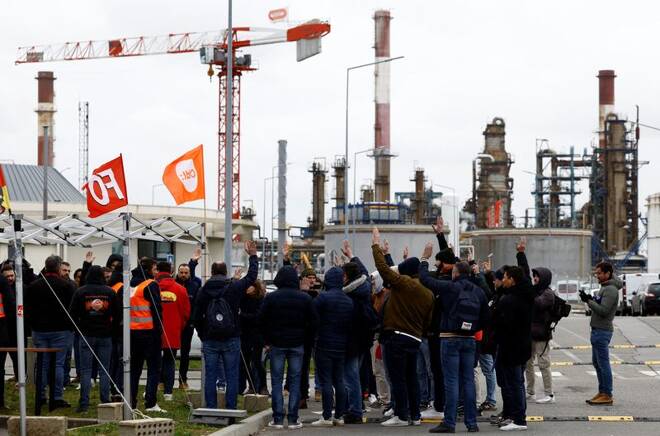Advertisement
Advertisement
French Senate votes for Macron’s pension plan, despite new protests
By:
PARIS (Reuters) - France faced a seventh day of demonstrations on Saturday against President Emmanuel Macron's unpopular pension reform plans amid ongoing rolling strikes which have affected refineries, public transport and garbage collections.
By Benoit Van Overstraeten and Forrest Crellin
PARIS (Reuters) -The French Senate on Saturday night adopted President Emmanuel Macron’s unpopular pension reform plan in the wake of a seventh day of demonstrations that were not as large as authorities had expected.
One hundred and ninety-five members of the upper house of the French Parliament voted for the text, whose key measure is raising the retirement age by two years to 64, while 112 voted against.
The protests – and rolling strikes that have affected refineries, public transport and garbage collections – aimed to pressure the government to withdraw the pension plan, which it said is essential to ensure the pension system does not run out of money.
“After hundreds of hours of discussions, the Senate adopted the pension reform plan. It is a key step to make a reform happen that will guarantee the future of our pension system,” Prime Minister Elisabeth Borne wrote on Twitter.
She added she was “totally committed to ensure the text will be definitively adopted in the coming days”.
Now that the Senate has adopted the bill, it will be reviewed by a joint committee of lower and upper house lawmakers, probably on Wednesday.
If the committee agrees on a text, a final vote in both chambers is likely to take place on Thursday, but the outcome of that still seems uncertain in the lower chamber, the National Assembly, where Macron’s party needs allies’ votes for a majority.
If the government fears it won’t have enough votes in the lower house, it is still possible for it to push the text through without a parliamentary vote, via a so-called 49:3 procedure.
An additional day of nationwide strikes and protests was planned for Wednesday.
Fewer than expected at saturday’s marches
According to figures from the interior ministry, 368,000 demonstrators marched through various cities on Saturday. Authorities had expected up to 1 million people to take part.
As with the previous protests, Saturday’s events were free of any major scuffles with the police.
On Tuesday, 1.28 million people took to the streets, the highest turnout since the start of the protest movement, according to government figures.
In a joint statement, the French unions, maintaining a rare show of unity since the protest movement was launched at the end of January, called on the government to organize a “citizens’ consultation” as soon as possible.
The unions plan to keep up pressure “and to keep on proving that the vast majority of the population remains determined to say no to the proposed bill,” they said.
Opinion polls show a majority of voters oppose Macron’s plan, while a slim majority supports the strike actions.
Lower power supply due to strikes
“A lot of things can still happen next week,” Marylise Leon, deputy secretary general of the CFDT union, the country’s largest, told Franceinfo radio. “Will the text be voted in the National Assembly? We have to rally. It’s now or never.”
A spokesperson for TotalEnergies said that strikes continue in the oil major’s French refineries and depots, while public railway operator SNCF said national and regional services would remain heavily disrupted over the weekend.
In Paris, garbage continues to pile up on the streets, with residents seeing a growing presence of rats, according to local media.
National power production in France was reduced by 7.1 gigawatts (GW), or 14%, at nuclear, thermal and hydropower plants on Saturday due to the strikes, a CGT union spokesperson told Reuters.
Maintenance was also blocked at six French nuclear reactors, including Penly 1, the spokesperson said.
(Reporting by Tangi Salaun, Forrest Crellin and Benoit Van Overstraeten; Editing by Frances Kerry and Grant McCool)
About the Author
Reuterscontributor
Reuters, the news and media division of Thomson Reuters, is the world’s largest international multimedia news provider reaching more than one billion people every day. Reuters provides trusted business, financial, national, and international news to professionals via Thomson Reuters desktops, the world's media organizations, and directly to consumers at Reuters.com and via Reuters TV. Learn more about Thomson Reuters products:
Latest news and analysis
Advertisement
